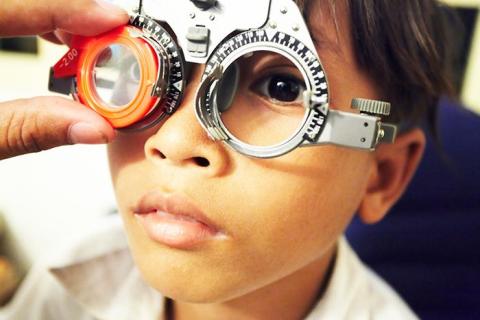
Ted, 14, was recently brought to Embu Level V Hospital, Kenya, having injured his left eye the previous evening while fetching firewood for cooking dinner. When the clinician examined him, he noted his left eye had significant bleeding and was quite swollen. He immediately referred him to a specialized eye care center where he arrived late. On seeing him, the doctors took him to theater the following day where he was noted to have severe corneal perforation and inflammation of the eye ball. It was impossible to repair his eye and ended up undergoing enucleation (removal of eyeball) rendering him permanently blind on his left eye.
“I feel bad about the whole thing, I want to be a doctor and I hope this will not stop me,” Ted says with a bandage covering his left eye. “He is a very bright boy and he is always on top of his class,” says the mother. Ted is one of the approximated 300 million people around the world who have visual impairment with approximately 39 million people having total blindness. One is likely to develop blindness if they live in low income areas.
“There are preventable and non-preventable causes of blindness,” says Douglas Kinoti, 51, an eye expert based in Embu Level V Hospital, Kenya. “Common causes of preventable blindness are glaucoma, cataracts, injuries, corneal ulcers, and infections. Viral keratitis (inflammation of cornea) is also common because of increased prevalence of herpes and HIV infection.” He says, “If these conditions are noted early they can be managed. Children can also have congenital cataracts and refractive errors which can also be corrected.”
“Cataract is one of the commonest unpreventable causes of blindness. Cataracts result in haziness of the lens hence inability to see. They develop in persons aged 40 years and above.”
“Diabetes predisposes one to cataracts and diabetic retinopathy especially when the sugars are not well controlled. The early stages of the retinopathy can be managed with laser therapy but the late stages cause permanent eye damage. People with diabetes should undergo regular eye examination.”
Glaucoma is a condition which occurs when high pressures within the eyeball damage the optic nerve causing loss of vision. “Glaucoma is painless hence many people do not seek treatment early when it is very necessary. You can be able to see far yet have tunnel vision.” Tunnel vision occurs when one cannot see on the sides. “Normally we do a slit lamp test and determine eye pressures for anyone between 35 – 40 years and above and people with poor vision which does not improve on pin-hole test.”
“Glaucoma has a tendency to run in families. We recommend check up to anyone who has a relative who has the condition and anyone above 40 years who has farsightedness.”
“Many people when they develop visual impairment such as inability to read normally use shortcuts and go to the optical shops where they are prescribed for glasses. If one has an underlying condition like glaucoma or diabetes and it is not adequately addressed, they may not get improvement until the condition is treated. It is always important to get proper eye examination before one uses glasses.”
Injuries like Ted's have become quite common in recent past. “Many motorcycle riders do not use protective glasses or helmets hence small insects, caterpillar wings and foreign particles lodge in the eyes. If this happens for a long time, they fail to clear completely. Metal particles in the eyes cause rust which lead to corneal scarring,” says Kinoti. “If one gets an injury, the best thing to do immediately is to pad the eye and go to an eye facility.”
“For those with eye infection, it is important to get the right treatment. Many people are wrongly given steroid based medication which can worsen their problem especially if one has viral eye infection.”
“Parents are advised to examine their children for the white reflex in the eye. White reflex in newborns or children is either a sign of congenital cataracts or eye cancer called retinoblastoma. If these conditions are captured and treated early, the outcome is usually good.”
“Generally people should maintain cleanliness of the eyes to avoid infections, seek early treatment if one has eye problems, and should not share eye medication. People should also be evaluated for eye problems by the rightly trained personnel,” says Kinoti.